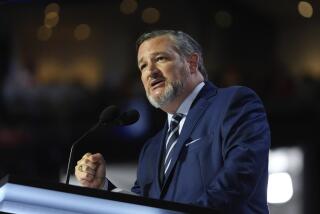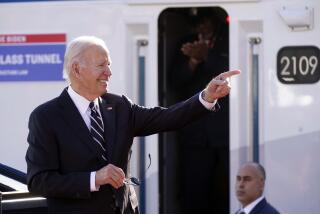Paul sees threat in ‘NAFTA highway’
WASHINGTON — The man from Arlington, Texas, could barely contain his smirk as he looked into a computer video camera to pose a question of Republican presidential candidate Ron Paul.
Paul’s followers talk about such conspiracy theories as “merging the United States with Canada and Mexico . . .,” the questioner said in a YouTube video shown during the Wednesday debate. “Do you really believe in all this?”
Paul did not miss a beat. The Texas congressman coolly raised the specter of a dire new national threat -- an as-yet unbuilt superhighway.
A border-spanning “NAFTA highway” now on the drawing board, Paul said, would link the U.S., Mexico and Canada, worsening illegal immigration and threatening American independence. “Our national sovereignty is under threat,” Paul warned.
Federal and state highway and trade officials and transportation consultants reacted Thursday with befuddlement and amusement. The fearsome secret international highway project Paul described does not exist, they said.
“There is no such superhighway like the one he’s talking about,” said Ian Grossman, a spokesman with the Federal Highway Administration. “It doesn’t exist, in plans or anywhere else.”
“It’s complete fiction,” said Tiffany Melvin, executive director of NASCO, a consortium of transportation agencies and business interests caught in the cross hairs of anti-highway activists. “This is the work of fringe groups that have wrapped a couple of separate projects together into one big paranoid fantasy.”
A loose confederation of conservative Internet bloggers and some right-wing groups, among them the John Birch Society, has seized on a burst of activity in federal highway projects in recent years as evidence that the Bush administration is pushing toward a European Union-style government for North America.
The problem, public officials said Thursday, is that the new emphasis on highway construction reflects a growing concern about renewing the crumbling U.S. road system, not a secret extension of the North American Free Trade Agreement.
“These whispers have been around in some form or another ever since NAFTA was signed,” said Grossman, who pointed out that numerous U.S. highways already are connected to Mexican and Canadian thoroughfares.
Paul took up the issue in recent years, sounding alarms in the Congressional Record after activists rallied against a $1- billion Texas project that aimed to build a privately financed highway corridor from the border with Mexico to the Oklahoma state line.
“The ultimate goal is not simply a superhighway,” Paul wrote to his constituents in October 2006, “but an integrated North American Union -- complete with a currency, a cross-national bureaucracy, and virtually borderless travel within the Union.”
During the Wednesday debate, Paul also linked the purported NAFTA highway to his concerns about the Trilateral Commission -- an enduring bugaboo of conspiracy theorists -- and the World Trade Organization’s “control [of ] our drug industry, our nutritional products.” Paul added: “I don’t like big government in Washington, so I don’t like this trend toward international government.”
Jesse Benton, Paul’s campaign spokesman, said Thursday that Paul believed that the threat of a NAFTA highway was real. “Dr. Paul is not alone in thinking this is a substantial compromise of federal sovereignty,” Benton said. “There’s a strong belief by a lot of people that [the highway] would run clear up through Canada.”
Benton noted that Rep. Virgil H. Goode Jr. (R-Va.) had introduced a resolution expressing opposition to a NAFTA superhighway. It is signed by 42 congressmen, including Paul and two of his Republican presidential rivals, Reps. Duncan Hunter of California and Tom Tancredo of Colorado.
In Texas, Benton added, legislators voted to withhold funding from the project linking Mexico to Oklahoma, known as the Trans-Texas Corridor, despite Gov. Rick Perry’s support. But with much of the $1-billion project expected to be defrayed by private developers, the effort is moving forward, said Coby Chase of the Texas Department of Transportation.
The anti-highway movement has surged from a Texas-based group, CorridorWatch.org, to old-line groups like the Birch Society and to Jerome Corsi, a conservative author who aided the Swift boat targeting of Sen. John F. Kerry during the 2004 campaign.
As alarms about NAFTA’s illusory highway have spread across the Web, the issue’s whiff of paranoia has ignited sparks of humor. Comedy Central mock commentator Stephen Colbert took up the issue earlier this year, saying the highway plan was real “because I got it from the Internet.” He added that “it’s a plan to make Canada, the U.S. and Mexico one country and force us to eat moose tacos.”
--
More to Read
Sign up for Essential California
The most important California stories and recommendations in your inbox every morning.
You may occasionally receive promotional content from the Los Angeles Times.










